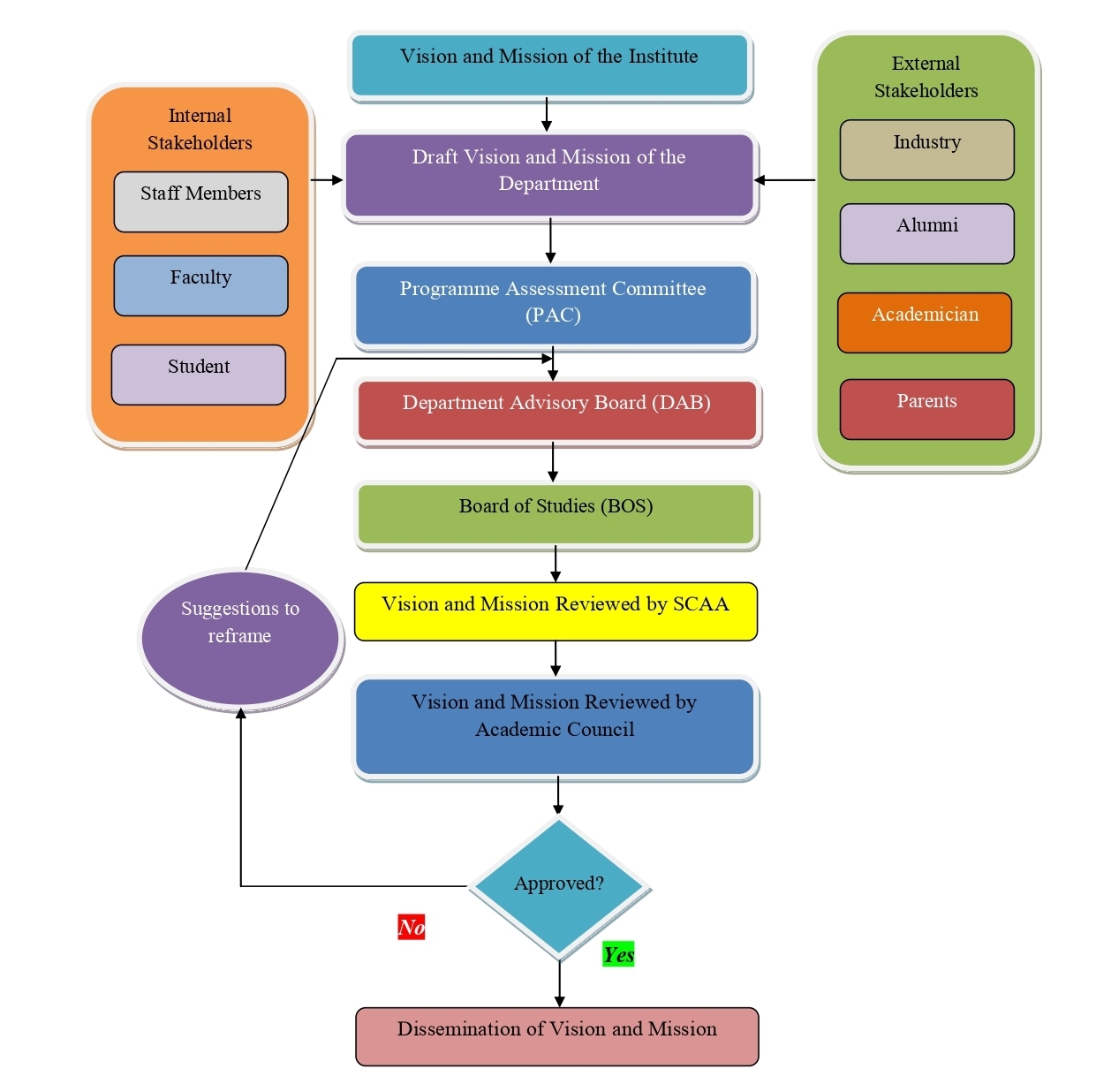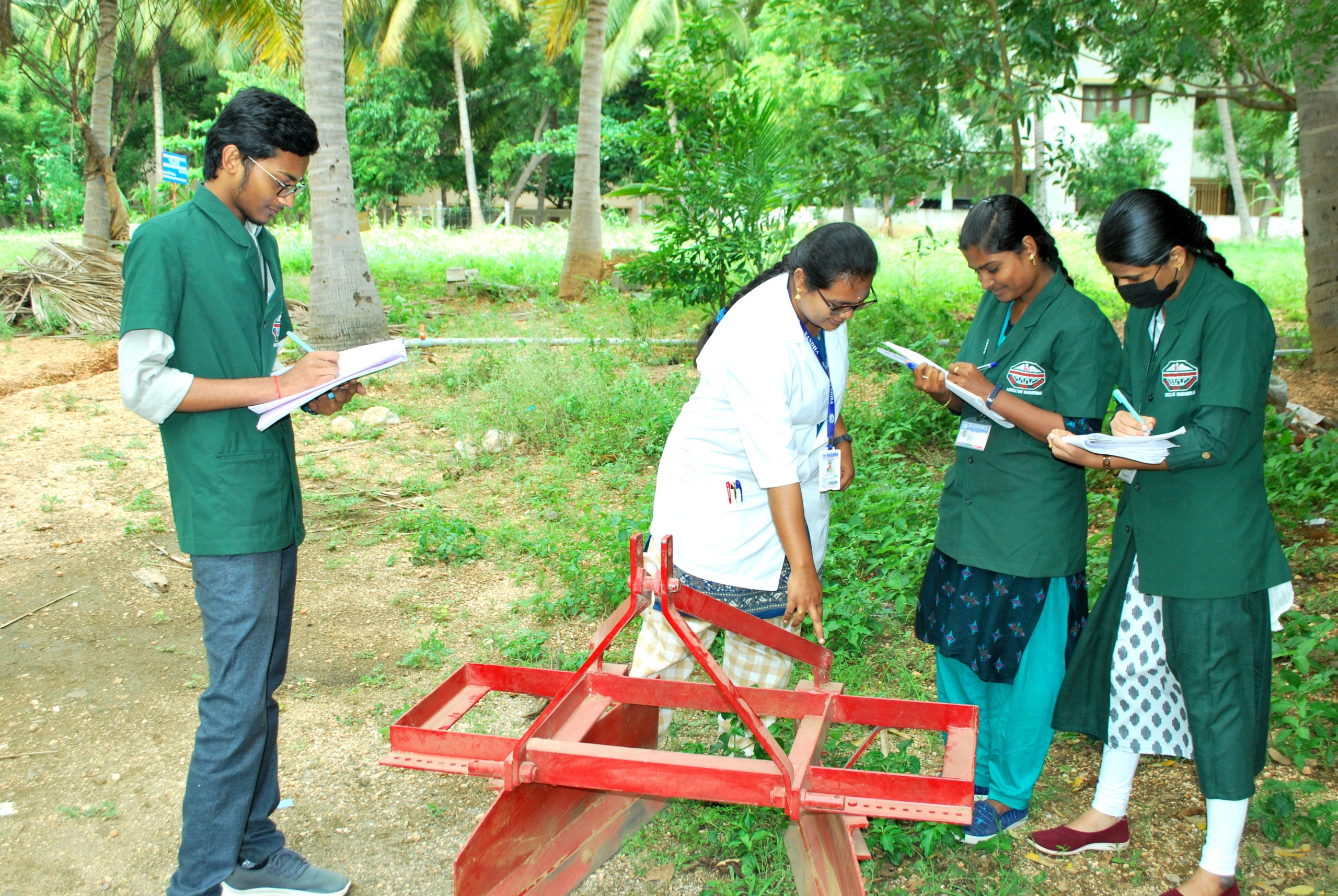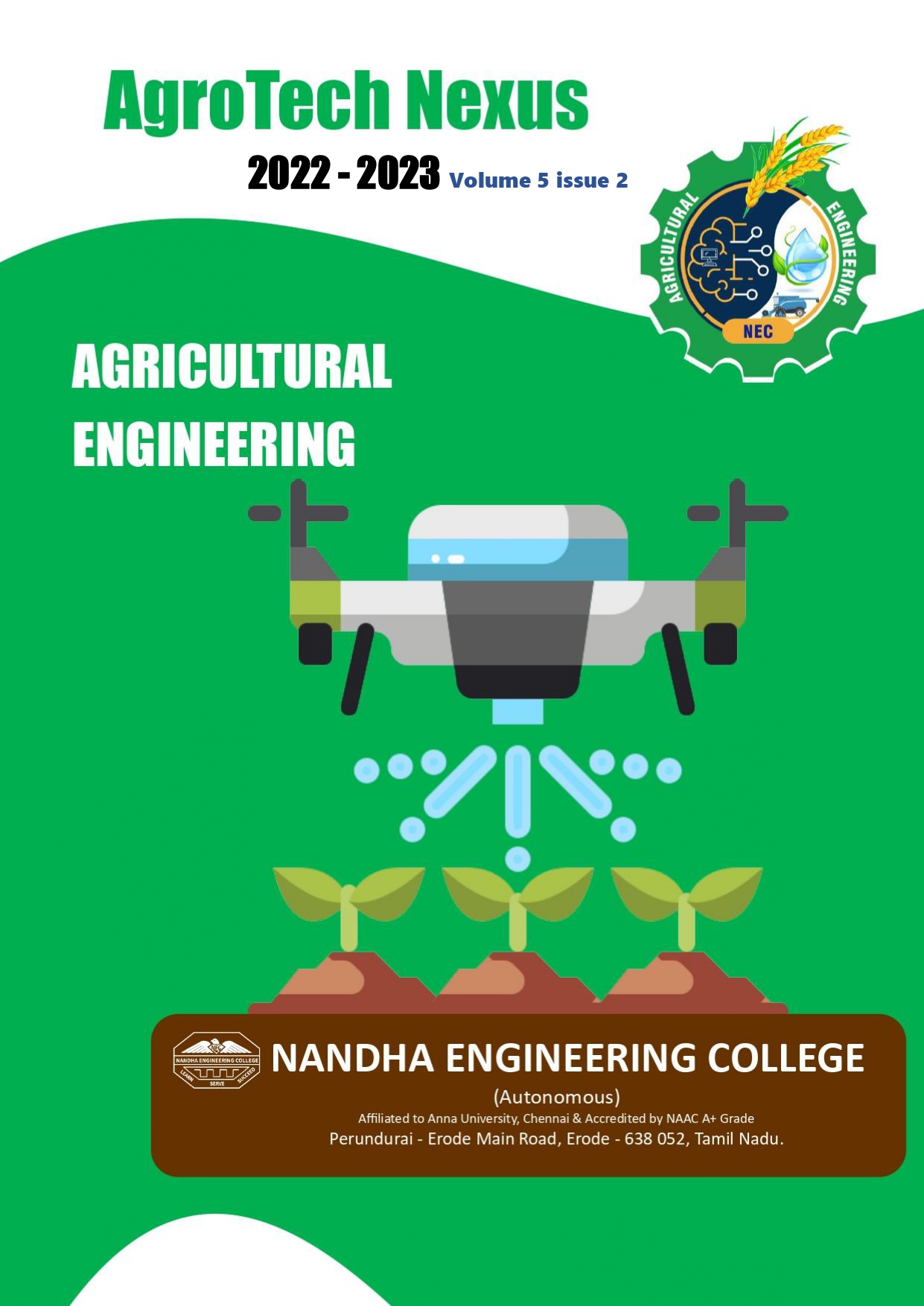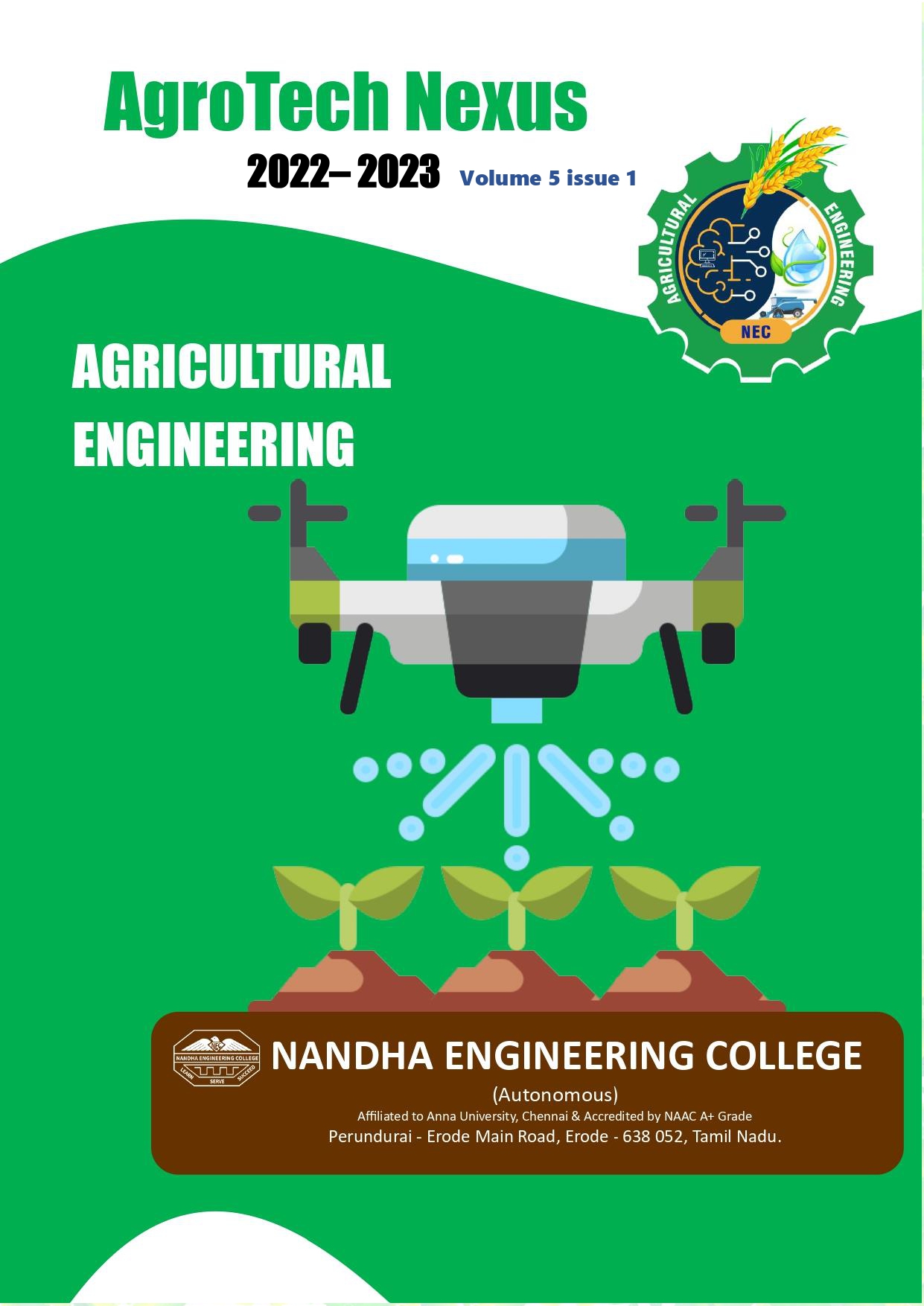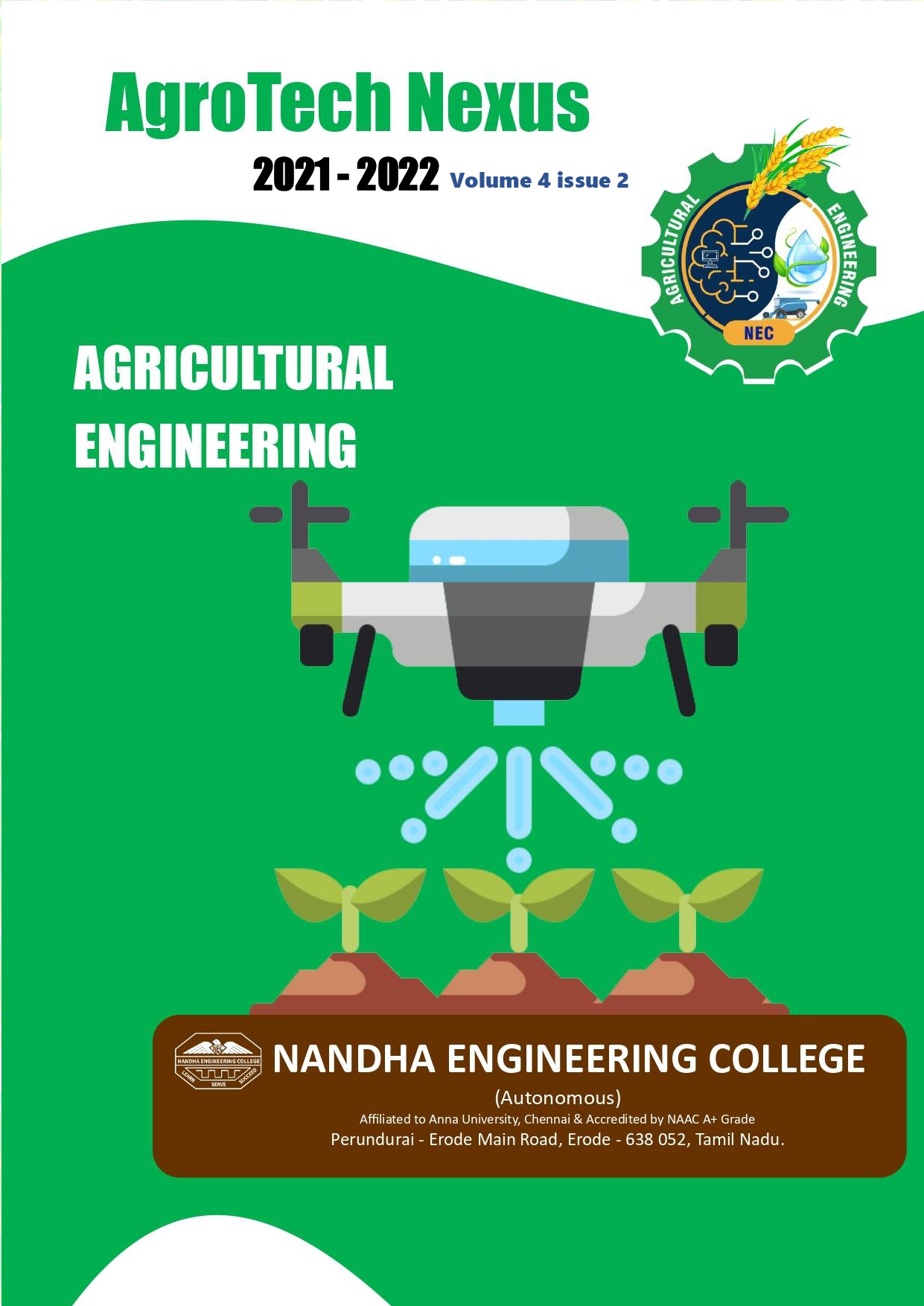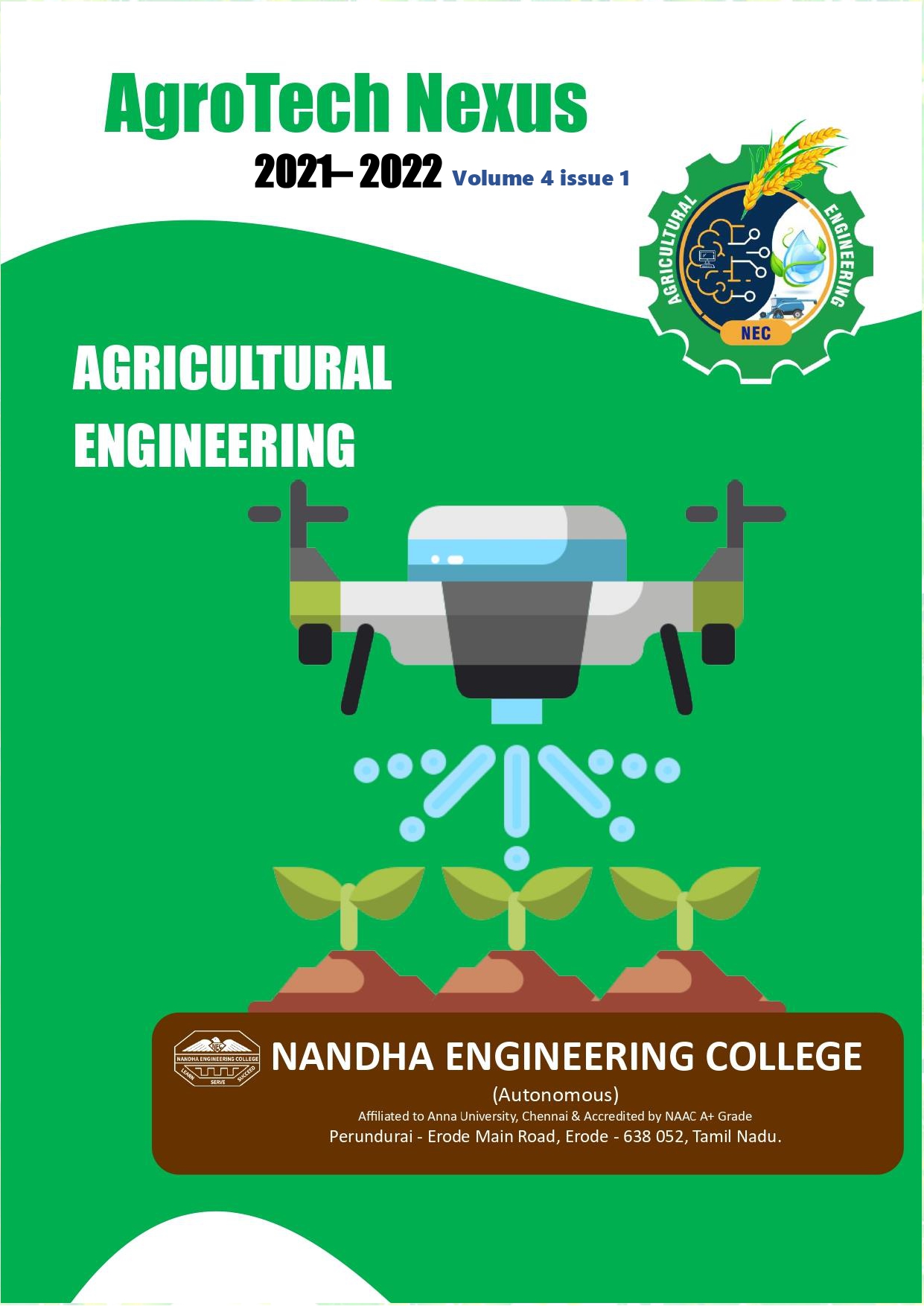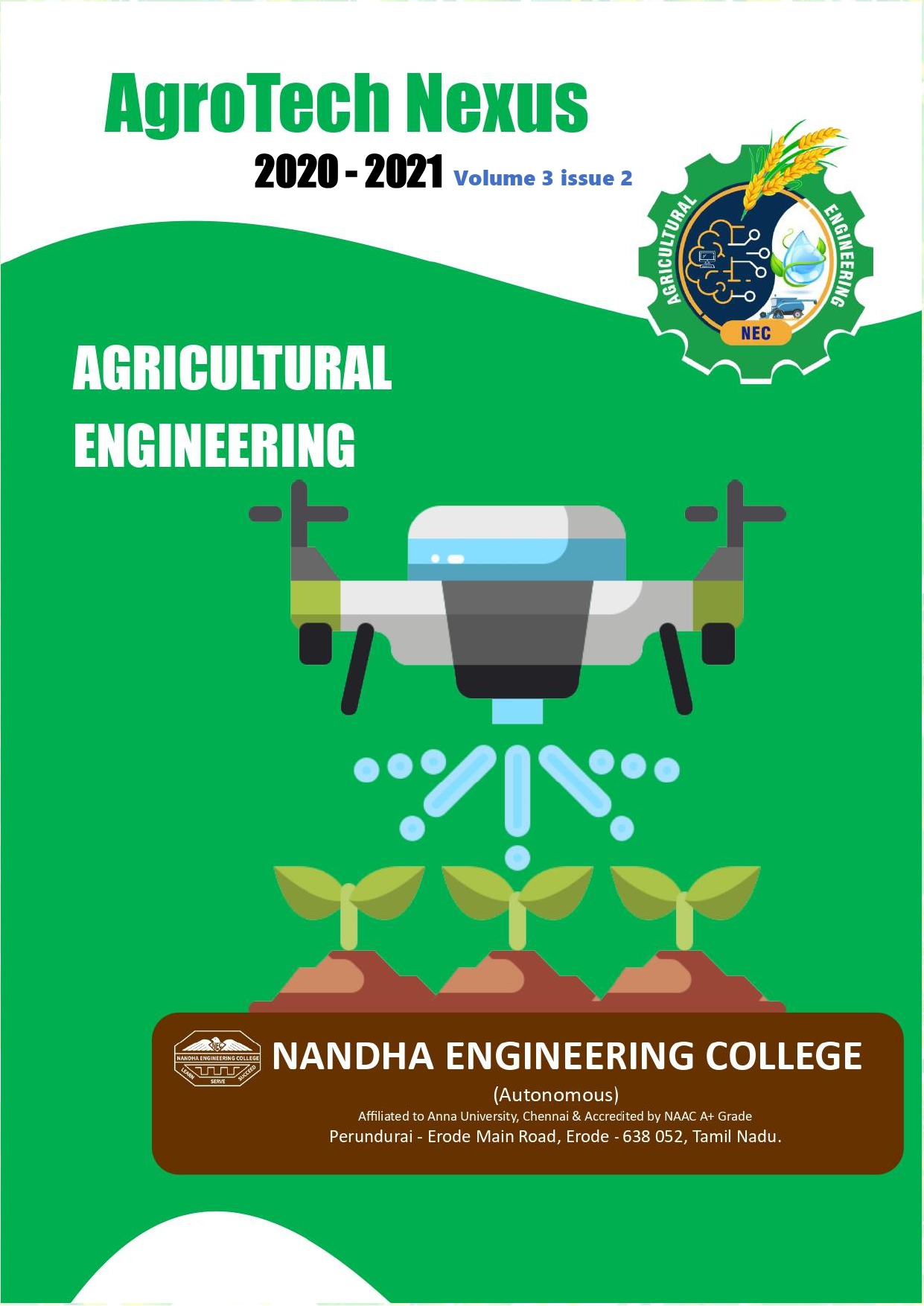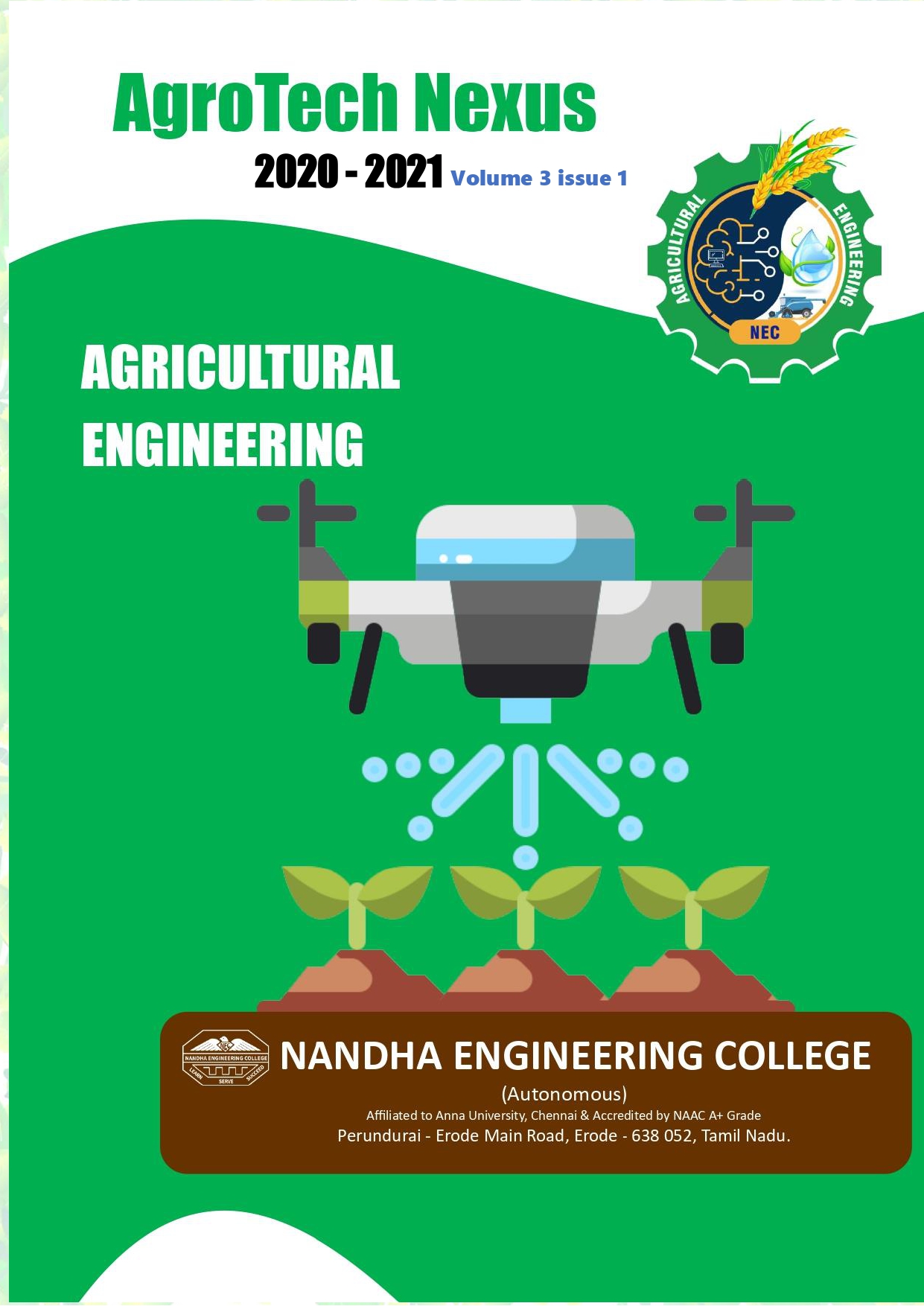
About the Department

The Department of Agricultural Engineering was established in 2017 with an intake of 60 students and the current intake of the students remains same. The department has well-qualified faculty members with expertise in different disciplines like Farm Machinery, Renewable Energy, Land and Water Management, Food Processing, Agronomy, etc. This program offers a comprehensive knowledge of engineering applications in agriculture, encompassing both conceptual field applications and the curriculum comprises various courses such as basic agriculture, basic engineering, soil and water conservation, farm machinery and power, food processing, and renewable energy.
The department association with the professional bodies ISTE, ISAE, and SSS plays a significant role in enriching the quality of the curriculum. The program provides opportunity to the students to excel in all the fields and also helps them transform into young entrepreneurs. The department possesses 2 granted design patents and has published 45 Research articles in various fields.
Guest lectures and industrial visits are periodically arranged for the students to enhance their technical knowledge. The department strives for all-round excellence in students, encouraging them in all extracurricular activities. The average percentage of students admitted and the average student-faculty ratio for the last three academic years (2022-23, 2021-22 and 2020-21) were 83% and 16.17 respectively.
VISION AND MISSION
VISION
To foster academic excellence by imparting knowledge in Agricultural Engineering to meet the ever-growing needs of the society.
MISSION
To provide quality education to produce agricultural engineers with social responsibility
To excel in the thrust areas of agricultural engineering to identify and solve the real-world problems.
To create a learner-centric environment by upgrading knowledge and skills to cater the needs and challenges of the society.
B.Tech – Agricultural Engineering
Duration:
- 4 years (Regular) / 3 Years (Lateral Entry)
No. of Semesters:
- 8 (Regular) / 6 (Lateral Entry)
No. of Seats:
- Total – 60
Eligibility:
- 10, +2 system of Education Must have secured a pass in Physics, Chemistry and Mathematics in the qualifying examination.
CURRICULUM
FACULTY DETAILS
ACADEMIC YEAR 2024-2025
| S.No | Staff Name | Designation | Qualification |
| 1 | Dr.Kavitha Abirami C V | Prof | M.E.,PhD. |
| 2 | Dr.Ambika D | ASP | M.E.PhD. |
| 3 | Dr.Komalabharathi P | ASP | M.Tech., PhD. |
| 4 | Dr.Suvain K K | AP | M.SC., PhD. |
| 5 | Mr.Pradeepkumar K | AP | M.E.(PhD.) |
| 6 | Ms.Sandhiyadevi P | AP | M.Tech(PhD.) |
| 7 | Mr.Chandramohan.V | AP | M.E. |
| 8 | Mr.Bragadeeswaran T | AP | M.E.,(PhD.) |
| 9 | Ms.Sridharshini R | AP | B.E., MBA |
| 10 | Mr.Prasanth M | AP | M.E. |
| 11 | Ms.Vanisha S | AP | M.E. |
STUDENTS DETAILS
Students Name List Year Wise
- Students Achievement Details
PEOs, POs and PSOs
PROGRAM EDUCATIONAL OBJECTIVES (PEOs)
Program Educational Objectives are broad statements that describe the career and professional accomplishments that the program is preparing graduates to achieve
The graduates of Agricultural Engineers after 3 to 5 years will be.
PEO1: Core Competency: Successful professional with core competency and inter-disciplinary skills to satisfy the Industrial needs.
PEO2: Research, Innovation and Life-long Learning: Capable of identifying technological requirements for the society and providing innovative solutions to real time problems.
PEO3: Ethics, Human values, and Entrepreneurship: Able to demonstrate ethical practices and managerial skills through continuous learning.
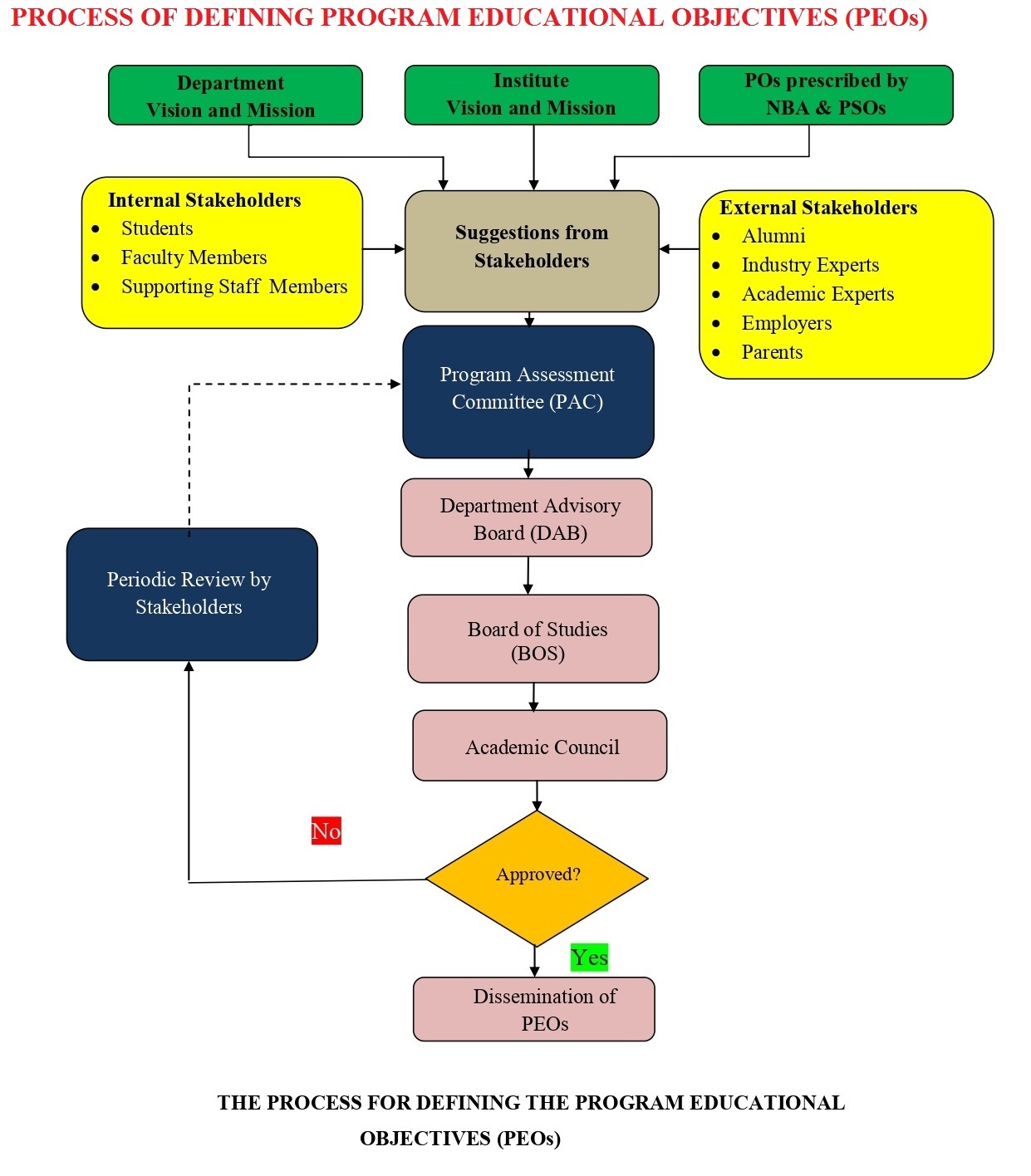
PROGRAM OUTCOMES (POs)
Program Outcomes are statements that describe what students are expected to know and be able to do upon graduating from the program. These relate to the skills, knowledge, attitude and behaviour that students acquire through the program.
PO 1: Engineering Knowledge: Apply the knowledge of mathematics, science, engineering fundamentals, and an engineering specialization to the solution of complex engineering problems.
PO 2: Problem Analysis: Identify, formulate, review research literature, and analyze complex engineering problems reaching substantiated conclusions using first principles of mathematics, natural sciences, and engineering sciences.
PO 3: Design / Development of solutions: Design solutions for complex engineering problems and design system components or processes that meet the specified needs with appropriate consideration for the public health and safety and the cultural, societal, and environmental considerations.
PO 4: A Conduct Investigations of Complex Problems: Use research-based knowledge and research methods including design of experiments, analysis and interpretation of data,and synthesis of the information to provide valid conclusions.
PO 5: Modern Tool Usage: Create, select, and apply appropriate techniques, resources,and modern engineering and IT tools including prediction and modeling to complex engineering activities with an understanding of the limitations.
PO 6: The Engineer and Society: Apply reasoning informed by the contextual knowledge to assess societal, health, safety, legal and cultural issues and the consequent responsibilities relevant to the professional engineering practice.
PO 7: Environment and Sustainability: Understand the impact of the professional engineering solutions in societal and environmental contexts, and demonstrate the knowledge of, and need for sustainable development.
PO 8: Ethics: Apply ethical principles and commit to professional ethics and responsibilities and norms of the engineering practice.
PO 9: Individual and Team Work: Function effectively as an individual and as a member or leader in diverse teams and in multidisciplinary settings.
PO 10: Communication: Communicate effectively on complex engineering activities with the engineering community and with society at large, such as, being able to comprehend and write effective reports and design documentation, make effective presentations, and give and receive clear instructions.
PO 11: Project Management and Finance: Demonstrate knowledge and understanding of the engineering and management principles and apply these to one’s own work, as a member and leader in a team, to manage projects and in multidisciplinary environments.
PO 12: Life-long Learning: Recognize the need for, and have the preparation and ability to engage in independent and life-long learning in the broadest context of technological change.
PROGRAM SPECIFIC OUTCOMES (PSOs)
Program Specific Outcomes (PSOs) refer to the specific abilities, knowledge, skills, and attributes that graduates are expected to possess upon completing a particular academic program or course of study
The students of Agricultural Engineering will be able to
PSO1: Design, analyze and apply the knowledge gained on agricultural machinery, tools, implements and production technologies to increase crop production, improve land use, soil nutrient and conserve resources like water, fertilizer, and energy.
PSO2: Apply the comprehensive knowledge of engineering properties of agricultural products for upgrading the unit operation and developing innovative process, value-added products, and advanced engineering technologies to meet the challenges in agriculture.
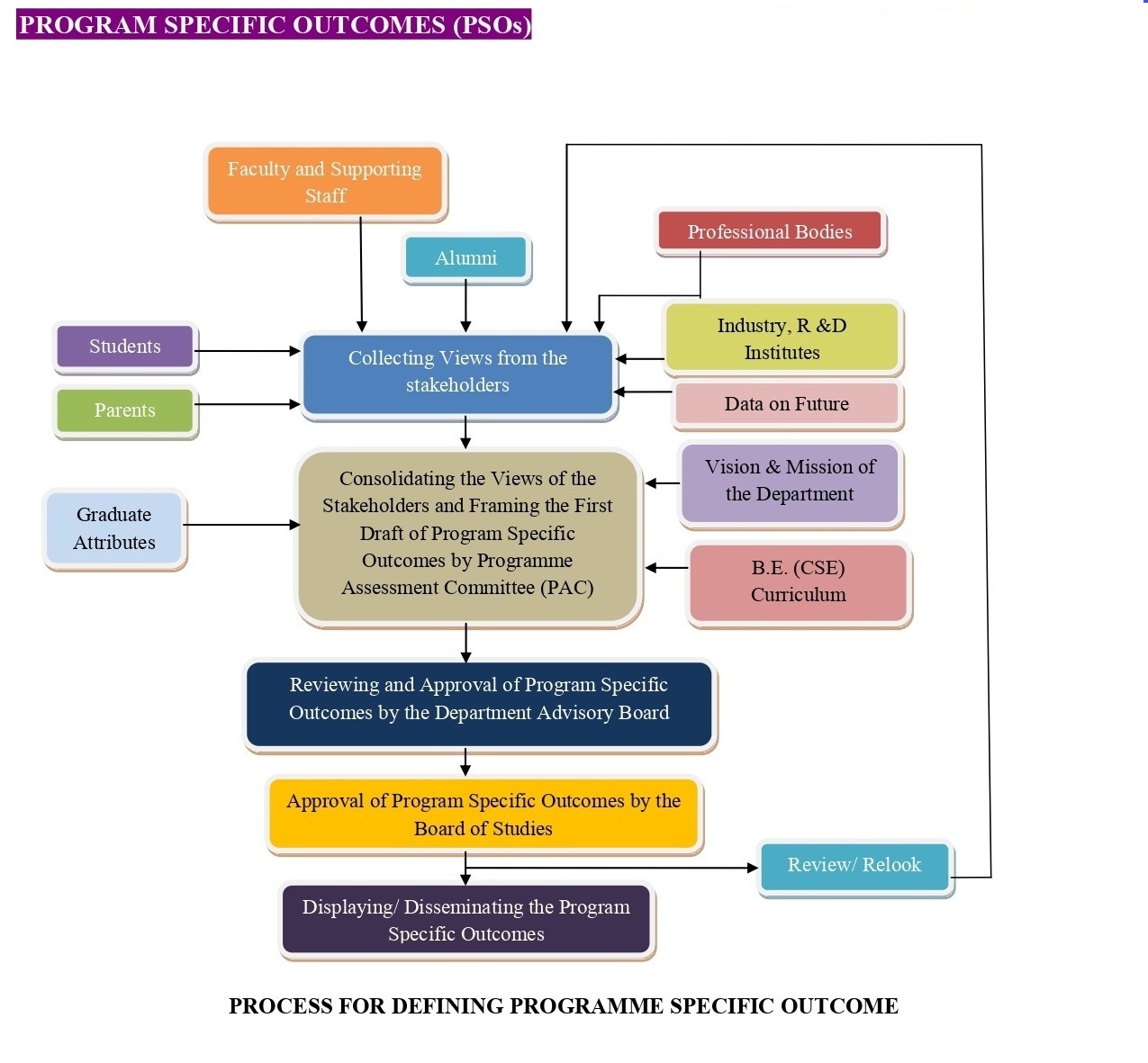
Board of Studies
COURSE OUTCOME AND ARTICULATION MATRIX
Course Outcomes (Cos):
Course Outcomes are narrower statements that describe what students are expected to know, and are able to do at the end of each course. These relate to the skills, knowledge and behaviour that students acquire in their progress through the course.
Placement and Internship Details
Placement Details
Book Publications
Prabha, D ,Transforming Agriculture of Future, Technology Adoption of Mobile Agro Advisory Services among the Farmers of Tamil Nadu, Dean, School of Post Graduate Studies, TNAU, CBE, 2017
Prabha, D ,Invigorating Transformation of Farm Extension towards Sustainable Development: Futuristic Challenges and Prospects, Service Preferences of Farmers over Mobile Agro Advisory Services, Extension Education Society, TNAU Campus, CBE, 2018
Prabha, D , Innovations and Advancements of in Agriculture and Plant Sciences, Dhanalakshmi Srinivasan Agriculture College, Perambalur, 2018
Prabha, D , Innovations and Advancements of in Agriculture and Plant Sciences, Economics of Drip Irrigation in Coconut Production, Dhanalakshmi Srinivasan Agriculture College, Perambalur, 2018
Prabha, D , Promoting Agriculture for Farmers Livelihood and Food Security, Impact: Changes over Fermers using Mobile Agro Advisory Services, Ramakrishna Mission vivekananda Educational and Research Institute, Faculty Centre for Agricultural Education and Research, Coimbatore, 2020
Komalabharathi, P., Karuppasamy Vikraman, V., Praveen Kumar, D., Boopathi, G and Subramanian, P. 2022. Hydrochar – sustainable and low-cost biosorbent for contaminant removal. In: Baskar, C., Ramakrishna, S., Daniela La Rosa, A. (eds) Encyclopedia of Green Materials. Springer, Singapore.
Praveen Kumar, D., Karuppasamy Vikraman, V., Boopathi, G., Komalabharathi, P and Ramesh, D. 2022. Nanocellulose from lignocellulosic biomass: Synthesis. In: Baskar, C., Ramakrishna, S., Daniela La Rosa, A. (eds) Encyclopedia of Green Materials. Springer, Singapore.
Karuppasamy Vikraman, V., Praveen Kumar, D., Boopathi, G., Komalabharathi, P and Subramanian, P. 2022. Biobased polymer electrolytes for supercapacitor applications. In: Baskar, C., Ramakrishna, S., Daniela La Rosa, A. (eds) Encyclopedia of Green Materials. Springer, Singapore.
Suvain, K. K., M. Aasif and T. Ragavan, “Sea Weeds: Can We Utilize/Manage Agronomically, 2022
Suvain, K. K. Methods of Weed Control – Chemical and Biological methods, Scientific Publication, 2022
Nithiya, K., Subramanian, P., Praveen Kumar, D., Komalabharathi, P., Karuppasamy Vikraman, V. 2022. Bio-Oil: A Green Biofuel. In: Baskar, C., Ramakrishna, S., Daniela La Rosa, A. (eds) Encyclopedia of Green Materials. Springer, Singapore.
Paper Publications
Prabha, 2021. Indigenous Knowledge Management vs Adam’s Knowledge Management. Acta Scientific Agriculture Vol.5, Issue 4: 44-45.
Prabha, D. and R. Arunachalam. An Analytical Study of Mobile Agro Advisories among the Farmers. MC Agriculture & Environmental Sciences 1.1: 26-31.
Prabha, D. and R. Arunachalam. Mobile SMS Advisories: An Analytical Study among Farmers. Research Biotica, 3(1): 033-036.
Chandrakumar, M., G.Parthasarathi, Prabha and S.Selvanayaki. 2018. Brand Awareness and Factors Affecting the Buying Behaviour of Fungicides in Onion cultivation: A Study on ‘AMISTAR’ Fungicide in Tamilnadu. An International Refereed, Peer Reviewed and Indexed Quarterly Journal in Science, Agriculture and Engineering, Vol. VIII, Special Issue (E), August, pp. 47-49.
Chandrakumar, M., G.Parthasarathi, Prabha and S.Selvanayaki. 2018. Factors Influencing the Fungicide Brand Preferences of Dealers in Onion Cultivation: A Study on ‘AMISTAR’ Fungicide in Tamilnadu. An International Refereed, Peer Reviewed and Indexed Quarterly Journal in Science, Agriculture and Engineering, Vol. VIII, Special Issue (E), August, pp. 50-52.
Prabha, D. and R. Arunachalam. 2017. Pattern of Mobile Agro Advisory Services Offered by Public Service Provider among the Farmers of Tamil Nadu. International Journal of Agriculture Sciences, Vol. 9(22), pp. 4254-4256.
Prabha, D. and R. Arunachalam. 2017. Mobile phone technology: An impact of farming community. Journal of Pharmacognosy and Phytochemistry. 719-721.
Prabha, D. and R. Arunachalam. 2017. Utilization Pattern of the Mobile Agro Advisory Services among the Farmers of Tamil Nadu. Trends in Biosciences- An International Fortnightly Journal, 10(2), pp. 907-910.
Prabha, D., Ravi Kumar Theodore and C. Karthikeyan. 2017. Behavioural Impact of e-Velanmai Model of Agricultural Extension Service. Trends in Biosciences – An International Fortnightly Journal, 10(1), pp. 279-283.
Prabha, D., Ravi Kumar Theodore and C. Karthikeyan. 2017. ‘e-Velanmai’ – An Innovative Approach of Agricultural Extension in Tamil Nadu. Contemporary Research in India, Vol. 7(1), pp. 72-77.
K Pradeep kumar, S. Naveen,M. Navinkumar,G. Raja, S. Sivasubramani., “ Advanced safety braking system by using Controlled fluid flow” International Journal of Intellectual Advancements and Research in Engineering Computations, Volume-6 Issue-1, 2018.
K Pradeep Kumar, Vaishali. V, Lakshmi Priya. B, Mohamudha Jumana Hasin. A, Logeshwaren. T, “Hydraulic Cassava Harvester” International Research Journal of Engineering and Technology (IRJET), Volume: 08 Issue: 03, Mar 2021.
K Pradeep Kumar, M.M. Pujara, S. Gokul, M. Gomathi, N. Muthukumar,” Solar Powered Smart Irrigation System” International Journal of Advances in Agricultural Science and Technology, Vol.8 Issue.3, pg. 48-56, March-2021.
Praveenkumar, K.Pradeepkumar, “Natural Fiber Jute and Egg Shell Powder as Filler Material” International Journal of Engineering Trends and Technology (IJETT) –Volume23, Number 1- May 2015.
K Pradeep kumar, S. Naveen, M. Navinkumar, G. Raja, S. Sivasubramani,” Design and Fabrication of Exhaust Gas Recirculation and pollution Control System in Petrol Engine” International Journal of Intellectual Advancements and Research in Engineering Computations, ISSN:2348-2079, Volume-6, Issue-1, 2018.
Pradeepkumar, B. Kavin, S. Manoj, R. Nanthakumar, S. Prabanjan, “ 90 Degree Rotate Steering Mechanism In Electrical Cars” International Journal of Intellectual Advancements and Research in Engineering Computations, ISSN: 2348-2079, Volume-7, Issue-2, 2019.
K Pradeepkumar, S. Akilan, M. Gobinath, D. Gowtham, M. Guruprasath, “Design and fabrication of portable solar operated chemical sprayer”, International Journal of Intellectual Advancements and Research in Engineering Computations, ISSN:2348-2079, Volume-7 Issue-2, 2019.
K Pradeep Kumar, C. Sridhar, M. Somanathan, D. Sivasankaran, R. Srinath, “Advanced safety braking system by using Controlled fluid flow” International Journal of Advanced and Innovative Research, Volume 5, Issue 3, 2016.
A Muthuvel, MK Murthi, NP Sachin, VM Koshy, S Sakthi, E Selvakumar,” Aerodynamic Exterior Body Design of Bus “International Journal of Scientific & Engineering Research 4 (7), 2453-7
MK Murthi, S Nithiyanandam, PS Srinivasan, D Sivakumar, T Ashok,” engine “International Journal of Applied Engineering Research 10 (1), 59-6,2015
K.Murthi,”Internal Combustion Engine Efficiency Improvements with Biodiesel Blends using CFD”Perspectivas em Ciencia da Informacao 22 (5), 281-298,2017
Jeya Prakash, R, Nirmala, R, 2018, ‘An Experimental Study on Rapid Chloride Penetration Test of Self Compacting Concrete’, International Journal of Trend in Scientific Research and Development, vol.3, no.3, pp. 272-277, ISSN : 2456-6470.
Amirthagadeshwaran, G & Jeya Prakash, R 2019, ‘An Experimental Investigation on Replacement of Aggregate with HDPE in Absorbent Pavements’, International Journal of Psychosocial Rehabilitation, vol.23, no.2 , pp. 1020-1028, ISSN : 1475-7192 (Scopus).
Jeya Prakash, R, Soundara, B & Christian Johnson, S 2020, ‘Sustainability of No-Fine Concrete with Fibre reinforcement’, The Journal of Environmental Protection and Ecology, vol.21, no.5, ISSN : 1311-5065 (Annexure I). IF – 0.65.
Jeya Prakash, R, Karthigaikumaran, M, Thanaprakash, P, Vignesh Kumar, V, Prakash, R, 2020, ‘Study on fibre reinforced pervious concrete’, International Journal of Intellectual Advancements and Research in Engineering Computations, vol.8, no.3, pp. 1-8, ISSN : 2348-2079.
Ashokkumar, S, Divyadharshini, R, Jeya Prakash, R, Thirumaran, J, 2021, ‘Analysing Smart Security and Monitoring device using IOT and manual method for Agriculture’, International Journal of Mechanical Engineering, vol. 6, no. 3, pp. 1000-1005, ISSN : 0974-5823 (Scopus).
Jeya Prakash, R, Soundara, B & Christian Johnson, S 2022, ‘No Fine Concrete Pavement – A Sustainable Solution for Flood Disaster Mitigation’, In: Ghosh C., Kolathayar S. (eds) A System Engineering Approach to Disaster Resilience. Lecture Notes in Civil Engineering, vol 205. Springer, (Scopus). https://doi.org/10.1007/978-981-16-7397-9_19
Komalabharathi, P., Mathumithran, R., Poonguzhali, T., Ramanarayanan, S., & Shafnas, K. S. 2023. An analysis of zero energy cool chambers to evaluate life of fruits and vegetables. International Journal of Research and Analytical Reviews. 10(2): 666 – 672
Komalabharathi, P., Tharshiny, M. R., Divya, V., Dharunya, P., & Gandhi, N. M. 2023. A Comprehensive Review on Pyrolysis Modeling. International Journal of Research and Analytical Reviews. 10(2): 173 – 184
Komalabharathi, P., & Subramanian, P. (2022). Energy Densification of Groundnut Shell through Microwave-Assisted Hydrothermal Carbonization. Madras Agricultural Journal, 109(special)
Komalabharathi, P., Subramanian, P., Ramesh, D., Karthikeyan, S and Duraisamy, M. R. 2022. Effect of hydrothermal temperature on sawdust hydrochar production produced through microwave assisted artificial coalification. Pollution Research. 41(2):421-424
Komalabharathi, P., Subramanian, P., Ramesh, D., Karthikeyan, S and Duraisamy, M. R. 2022. Optimization of microwave assisted artificial coalification for maximization of sawdust hydrochar production using Response Surface Methodology. Chemical Science Review and Letters. 11(42):165-169
Subramanian, P., Boopathi, G., & Komalabharathi, P. (2021). Discerning the value-addition process of de-oiled cashew nut shell. IJCS, 9(1), 1194-1196
Komalabharathi, P., Pugalendhi, S., Subramanian, P., Karthikeyan, S., & Mahendiran, R. (2018). Thermal Performance Analysis and Prediction of Steam Production from Solar Paraboloid Concentrator using Multiple Linear Regression (MLR). Madras Agricultural Journal, 105, (1-3):117-119
Sandhiyadevi, P., Endhuja, K. Giridharan K, Kamali S, Sakthi Vighnesh “Design and development of sesame threshing unit “Scientific Hub of Applied Research in Engineering and Information Technology 2021
Rakshana Begum M.,R. Sowbakiya Sandhiyadevi, “Characteristics analysis of locally available agro residues” Scientific Hub of Applied Research in Engineering and Information Technology 2021.
Shanmathi T., Sandhiyadevi, M. Endhuja, K. Giridharan, K. Kamali, S. Sakthi Vighnesh, “ Design and development of sesame threshing unit”, Advances in Engineering Technology and Management (NCAETM), 2021,
Sandhiya Devi, P., Abdul Kalam Azad, S., Kavin Kumar, D., Logu, P. and Naveen Kumar, P. “ Nutritional Analysis of Palmyra Tuber” International Journal of Innovative Research in Science, Engineering and Technology, 2020
Sandhiya Devi, P., Dineshkumar, P., Gomathi, S., Prasanth, M., and Subhiksha, R.” A Review on Groundnut Pod Separator” International Journal of Innovative Research in Science, Engineering and Technology, 2021
Kiruthika, S., Snthiya, S., Sowmika, K., Karunya, G. and Sandhiyadevi, P. “Design and Development of Sprayer Vehicle for Agriculture International Conference on Recent Innovation in Engineering, Technology and Management, 2019
Suvain, K. K. and Kalaisudarson, S. “Evaluation of Irrigation Scheduling and Weed Management Practices on Growth and Yield of Cowpea”, Multilogic in Science, Vol. VIII, special issue (A), pp: 282-284, August, 2018.
Suvain, K. K. and Kalaisudarson S. “Effect of Irrigation on Weed dynamics and yield of cowpea”, International Conference on Sustainable Management of Water Resources in India, pp: 224 – 226, 2019.
Kalaisudarson, S., Srinivasaperumal, A. P., Saravanaperumal, M., Sivakumar, G., and Suvain, K. “Effect of Irrigation and Weed Control Practices on Yiled Of Cowpea”, International Journal of Research and Analytical Reviews, pp: 386 – 390, 2019.
Suvain, K. K. and Kalaisudarson, S. “Influence of Irrigation Scheduling and Weed Management Practices on Growth Attributes of Cowpea”, Plant Archives, Vol. 21, No. 2, pp: 827-830, 2021.
Suvain, K. K., Paulpandi, V. K., Srinivasan, G., Subramanian, E., Indirani, R. and Prabakaran, K. Evaluating the incorporation method of crop residues and its impact on soil biological and chemical properties through decomposition. The Pharma Innovation Journal, SP-10(12): 1667-1671, 2021.
Suvain, K. K., Paulpandi, V. K., Srinivasan, G., Subramanian, E., Indirani, R. and Prabakaran, K. “Influence of Crop Residue, Inorganic Fertilizers and Vermicompost on the Growth, Yield and Yield attributes of Blackgram under Rice – Blackgram System. “Biological Forum – An International Journal”, 14(1): 794-799, 2022.
- D Vengatesh, V Chandramohan– “Aluminium alloy metal matrix composite: survey paper” International Journal of Engineering research and General Scienc. 2014
N Sankar, V Chandramohan “A study on mechanical behaviour of natural fiber reinforced composite” – Int. J. Sci. Eng. Res, 2015
Sankar N Muruganantham S, Chandramohan V “Experimental Analysis of Mechanical Properties in E-Glass Fiber Pipe”: International Journal of Science Technology & Engineering, Publication date 2016
Vengatesh D Ravikumar R, Chandramohan V “Review paper On Aluminium Alloys/Flyash/Rice Husk Ash Metal Matrix Composite, Journal:International Journal of Applied Engineering Research , Publication date: 2014
GK Arunvivek, G Maheswaran, S Senthil Kumar, M Senthilkumar, T Bragadeeswaran “Experimental study on influence of recycled fresh concrete waste coarse aggregate on properties of concrete” International Journal of Applied Engineering Research, Volume: 10 Issue: 03, Mar 2015.
PB Narandiran, T Bragadeeswaran, M Kamalakannan “Manufacture of Flyash Brick Using Steel Slag and Tapioca Powder” Jour of Adv Research in Dynamical & Control Systems,, Volume: 10 Issue: 03, Dec 2018.
GK Arunvivek, A Preetha, T Bragadeeswaran, D Mahendran “Study on Behavior of Paper Industry Treated Effluent as Mixing Water in Concrete for Pollution Control and Sustainable Development.” International Journal of Engineering Research & Technology,, Volume: 3 Issue: 08, Dec 2014
Anandhu , R.Girimurugan , “ Performance studies on proton exchange membrane fuel cell with slightly tapered single flow channel for dissimilar cell potentials”, Materials Today: Proceedings, ISSN: 2214-7853,Volume 06, Pages 1-9, October & 2022
Anandhu , R.Girimurugan “Experimental Investigations on Flexural Properties of Coconut Shell and Granite Particles Reinforced Epoxy Matrix Based Hybrid Bio-Composites” in International Journal of Mechanical Engineering, December 2021, Issue: 03,Volume 06, Pages 2039-2046, ISSN: 0974-5823.
Anandhu , R.Girimurugan “Thermal analysis of laser assisted machining cutting tool with Inconel 718 and Cubic Boron Nitride (CBN) material by Finite Element Method (FEM)” in Aegaeum Journal, April 2020, Issue: 04,Volume 08, Pages 1424-1437, ISSN: 0776-3808.
Anandhu , R.Girimurugan “Exploration and Improving the Life of Spark Plug by Treated Using Silicon Gel, Cr-Zn Oxide” in Journal of Advanced Research in Dynamical and Control Systems, November 2019, Volume 11, Issue: 12, Pages 174-181, ISSN: 1943-023X.
Anandhu , “Design and Fabrication of Swing Mechanism Device for Power Production in Sea Waves” in Glopal Research and Development Journal for Engineering, November 2019, Volume 04, Issue: 12, Pages 007-010, ISSN: 2455-5703.
Anandhu , R.Girimurugan “Comparative analysis of wear rate of coated HSS tool and non- coated HSS tool by using CR-ZN-NI ” in International Journal of Intellectual Advancements and Research in Engineering Computations, April 2019, Volume 07, Issue: 02, Pages 2807-2813, ISSN: 2348-2079.
Anandhu , R.Girimurugan “Eradication of Wastages Developed at the Dust Ejector Line in the Coal Mill” in International Journal of Intellectual Advancements and Research in Engineering Computations, April 2018, Volume 06, Issue: 01, Pages 730-735, ISSN: 2348-2079.
A Priyanka, KB Sujatha, T Sivakumar and V Rajasree “Morphological changes in the compatible grafts of tomato cv. PKM 1 with different solanaceous rootstocks” Journal of Pharmacognosy and Phytochemistry 2019; 8(3): 2416-2419
FUNDING PROJECTS / SEMINARS
| S.No. | PI/CO PI | Title | Funding Agency | Funding Type | Fund Received (in Rs) |
| 1 | Mr. K. Pradeep Kumar | “Solar thermal cooling systems” | ISTE TNP | Seminar | 10,000 |
| 2 | Mr. K. Pradeep Kumar | Latest phase change materials for sustainable solar energy production trends and opportunity with thermal cooling system perspective” | ISTE TNP | Seminar | 10,000 |
| 3 | Mr. K. Pradeep Kumar | Agri Robot | NEC | Project | 10,000 |
| 4 | Dr. S. Vanitha | Refinement and design of steam generator for dying industry | TNSCST | Project | 7,500 |
| 5 | Mr. M. Rabi Ahamed | Generating electricity from water pipeline | TNSCST | Project | 7,500 |
INNOVATION IN TEACHING AND LEARNING PROCESS
General
Scope of Agri. Engg.
Agri. Business Opportunities
https://www.youtube.com/live/15j5FSviuis?feature=share
Literature evidences on Traditional Agriculture
Honey bee rearing
Tomato Cultivation – Transplanting of Seedlings
Guava Cultivation
Ornamental Landscape Gardening – Cycas Propagation
Irrigation
Fluid Mechanics
Crop production and Husbandry
Building Materials
Bio- Thermal Conversion and Renewable Energy
Students Activities
Association Activities
Industrial Visit Details
Lab Facilities
The following labs are available in the Agricultural Engineering Department:
- Crop production Laboratory
- Soil science Laboratory
- Farm implement and Equipment Laboratory
- Farm tractors and Engines Laboratory
- Irrigation and drainage Laboratory
- Crop Process Engineering Laboratory
- Unit operations Laboratory
- Food and dairy Engineering Laboratory
CROP PRODUCTION LABORATORY
The laboratory focuses on practicing the students in crop cultivation. This lab helps the students to enhance their knowledge about seed selection, nursery preparation, cultivation practice, water management, pest and disease management.
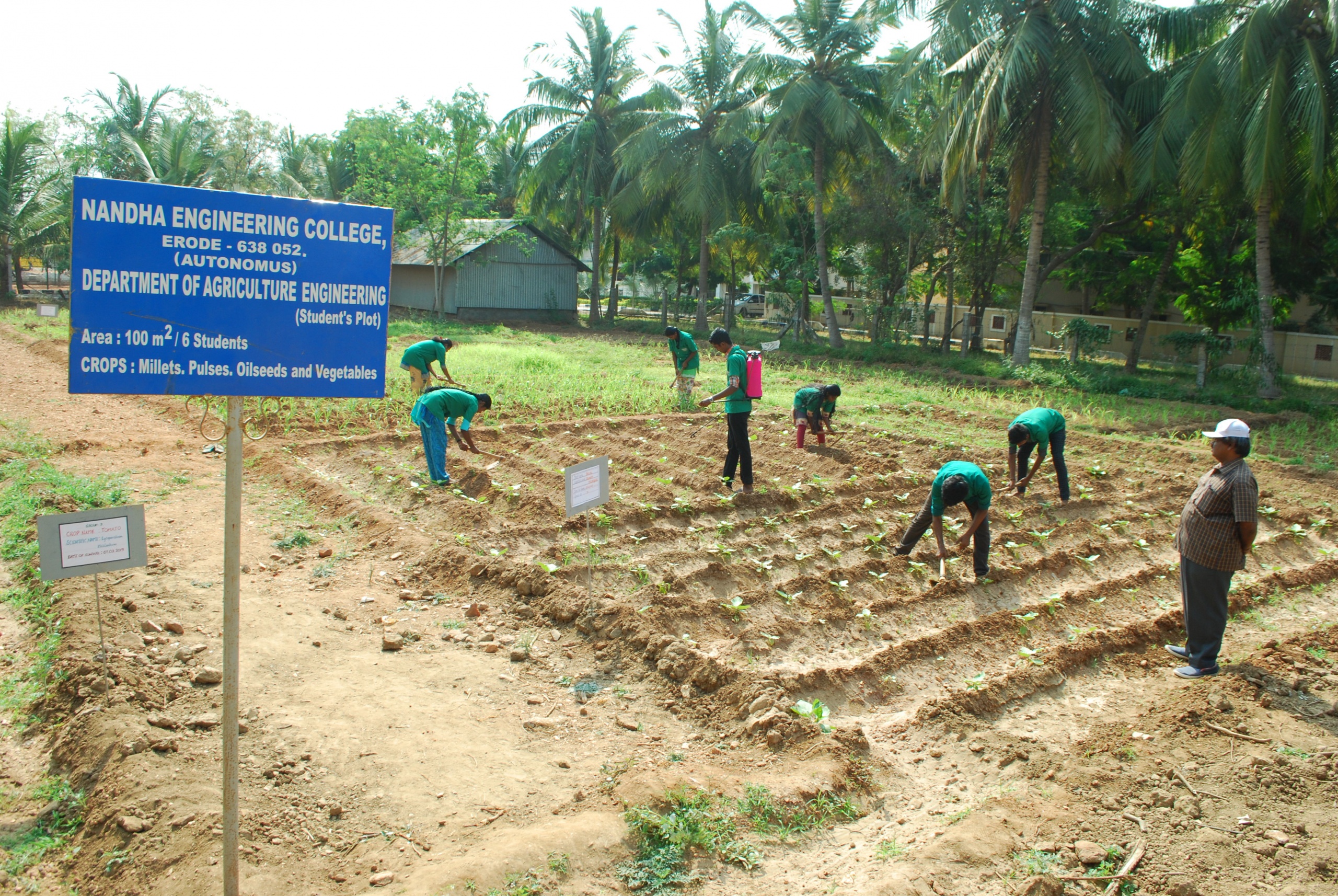 |
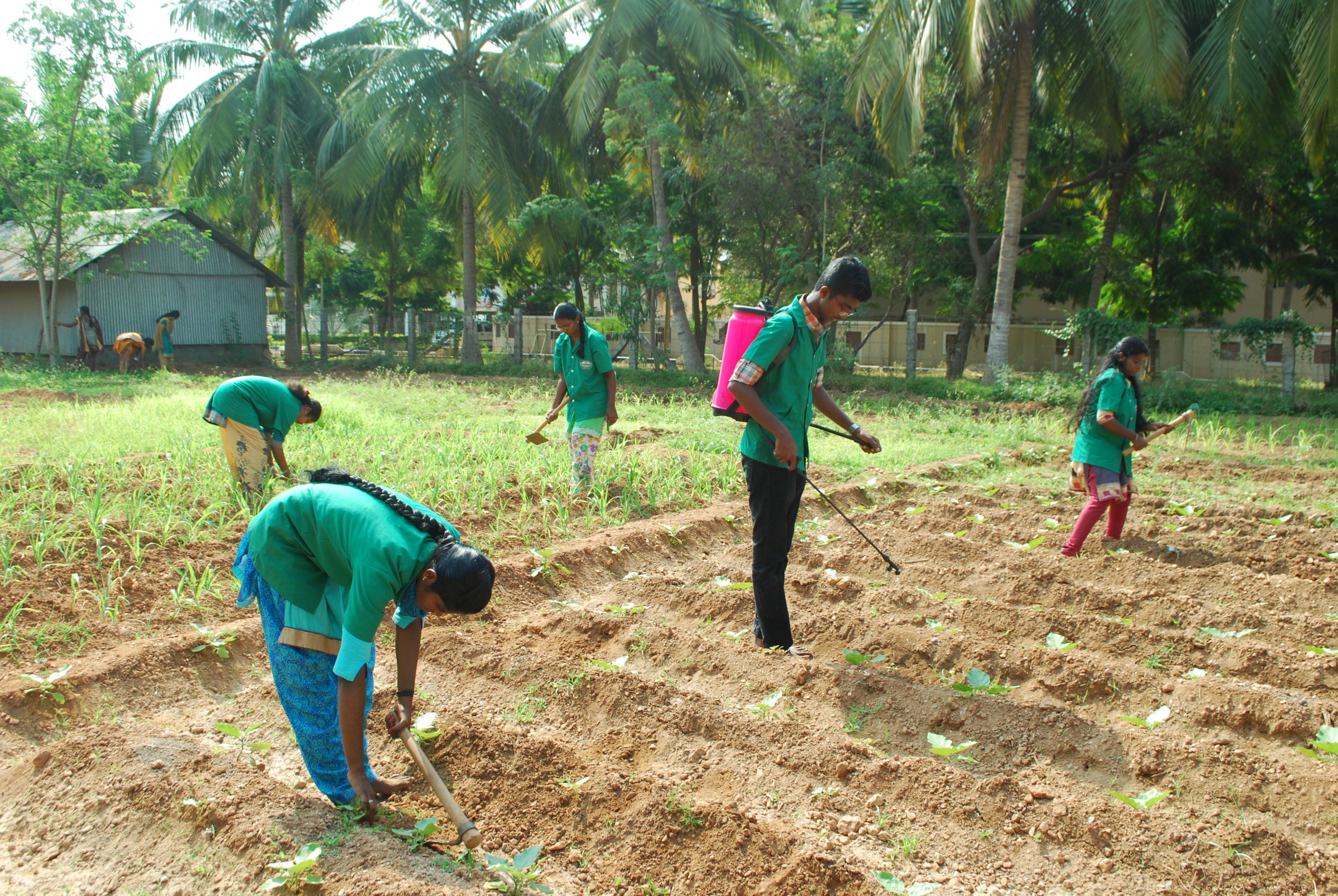 |
SOIL SCIENCE AND ENGINEERING LABORATORY
Soil science laboratory helps the students to obtain adequate knowledge in accessing in both physical and engineering behavior of soils through laboratory test tube procedures. This lab is equipped with various equipment to the soil quality.
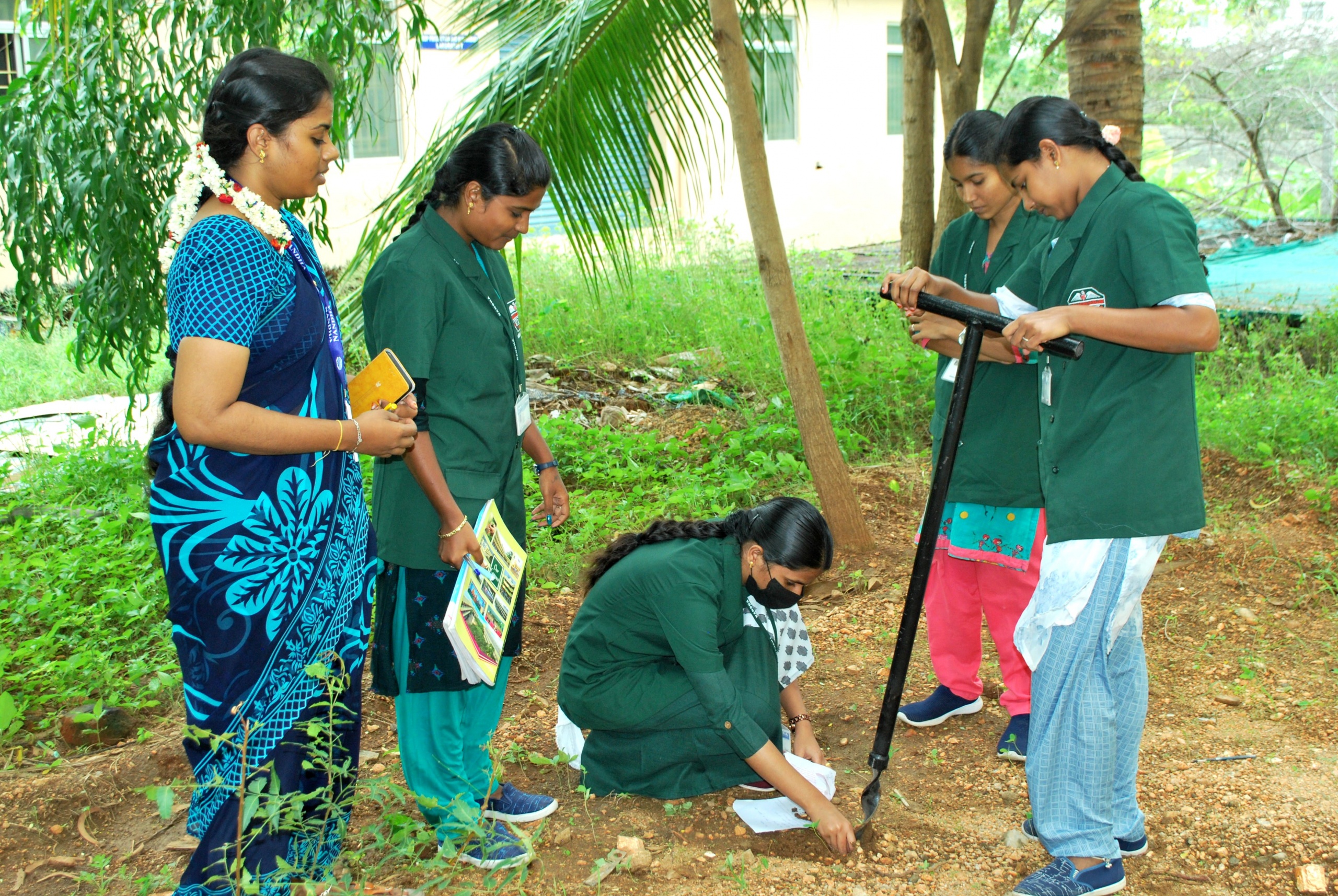 |
List of Equipments
- Hydraulic conductivity
- Double ring infiltrometer
- Soil core sampler made seam less steel
- Screw auger
- Robinson pipette
- Digital pH meter
FARM IMPLEMENT AND EQUIPMENT LABORATORY
Farm implements and equipment play a very important role in agricultural operations. Their availability makes the work much easier and faster. The lab is equipped with tillage, land preparation, sowing, weeding, and fertilizer equipment, where students undergo agricultural practices to increase the production and productivity of different crops through farm mechanization.
|
List of Equipments
- Mouldboard Plough
- Bund Former
- Leveller
- Ridge Plough
- Disc Harrow
- Disc Plough
- Spade
- Rotary Duster
- Hand Hoe
- Sickle
- Head Pan/Iron Pot
- Cono Weeder
- Rocker Arm Sprayer
- Crow Bar
- Chisel Plough
- Rotavator
- Cultivator
FARM TRACTORS AND ENGINES LABORATORY
A farm tractor is a vehicle designed and used primarily in agricultural operations for drawing or operating other farm machines, equipment, and implements of husbandry. The lab is equipped with farm tractors and engines that help students understand the basic engine operating systems, tractor operation, and maintenance practices.
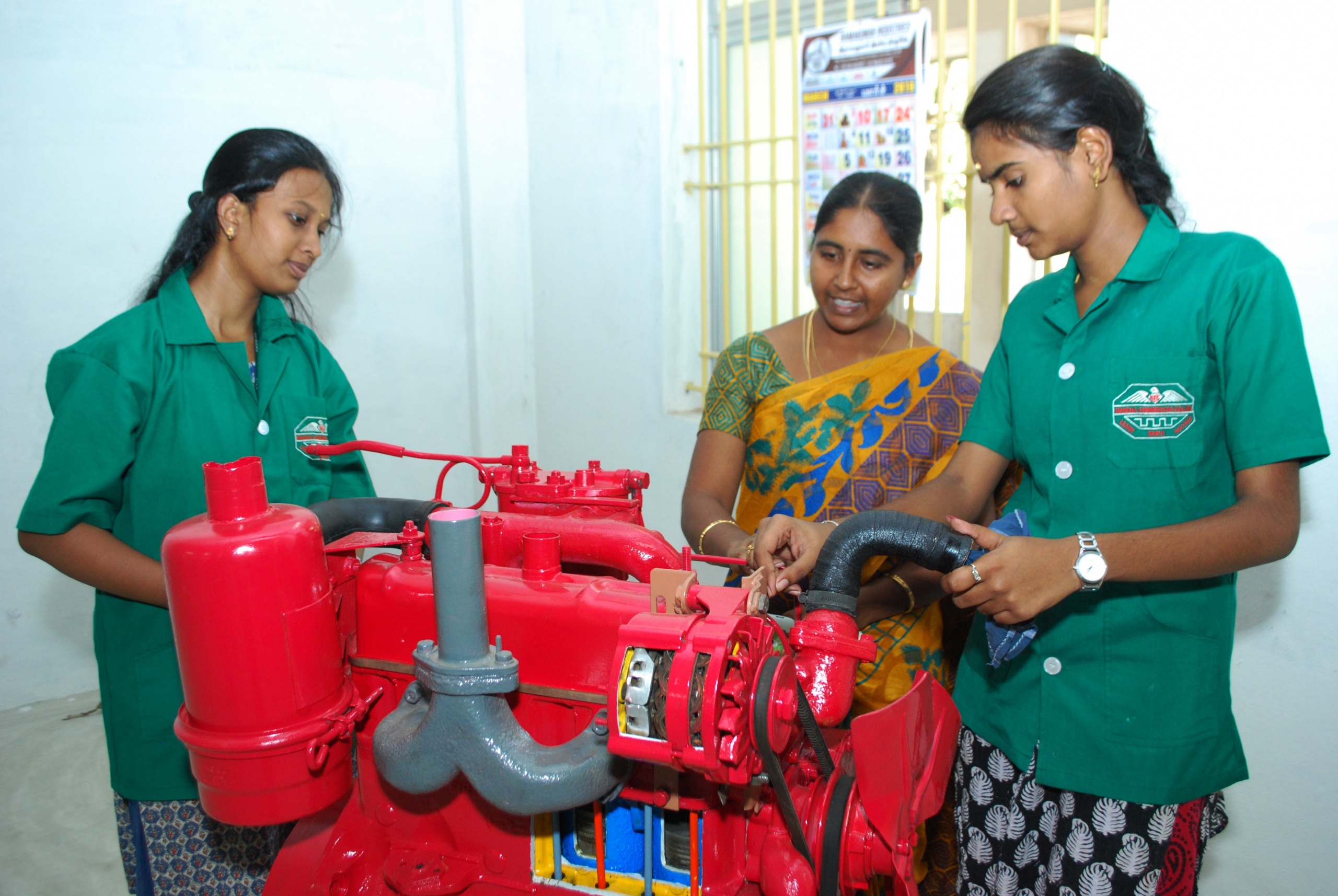 |
List of Equipments:
- Two Stroke Petrol Engine
- Four Stroke Diesel Engine
- Steering System
- Air Cleaner
- Differential Unit and Rear Axle
- Oil Pump
- Gear Transmission System
- Piston
- Camshaft
- Crankshaft
- Clutch System
- Tractor Front Tyre
- Tractor Rear Tyre
- Tractor Engine – Cut Section
IRRIGATION AND DRAINAGE ENGINEERING LABORATORY
The irrigation and drainage laboratory in agricultural engineering educates students in the field of open channel and ground water in combination with engineering principles and to understand soil, water and plant relationship. And how they can be applied to better manage surface and ground water resources. And also provide such kind of facilities for agricultural engineers to measure the basic data required for planning and designing of different irrigation projects.
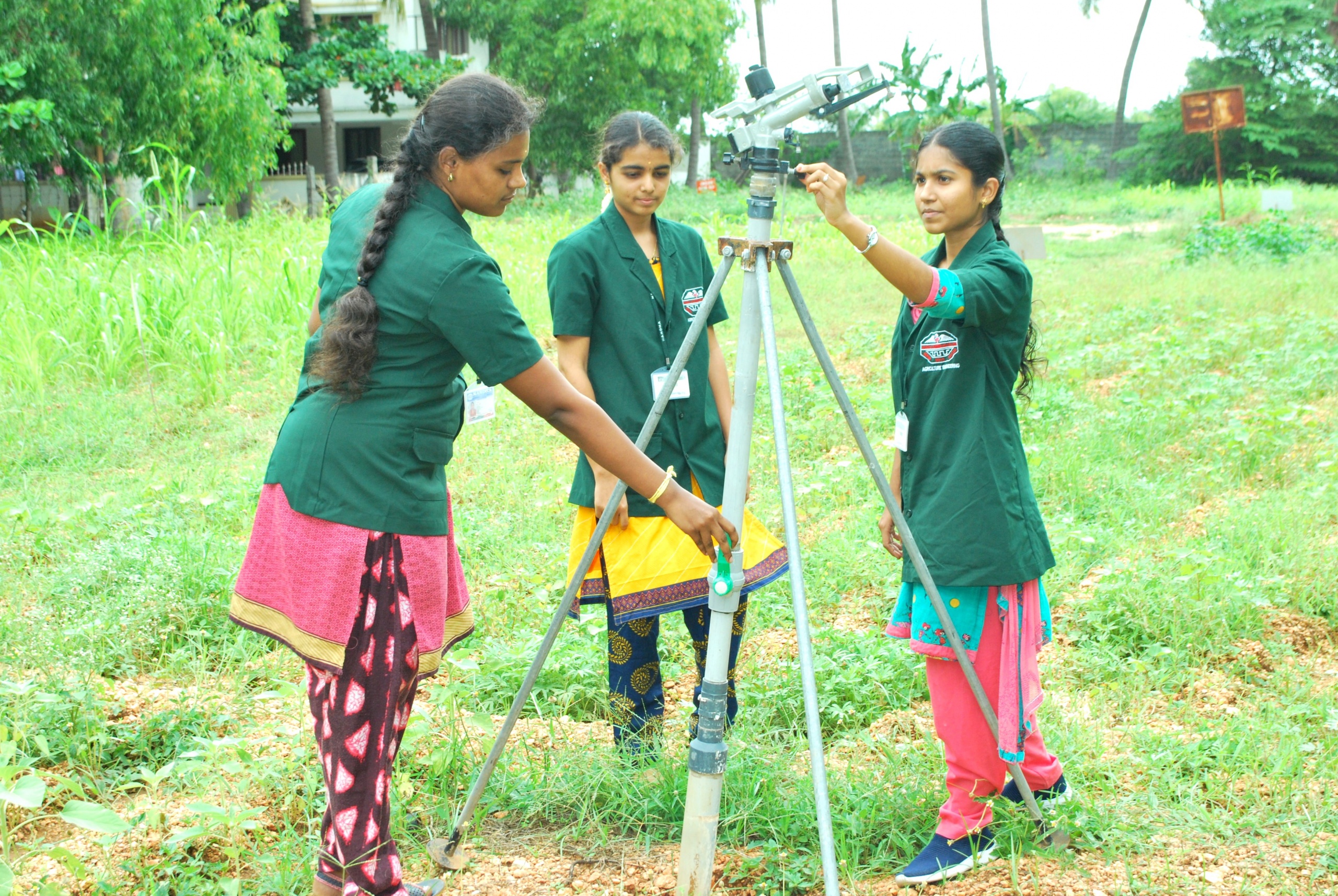 |
List of Equipments
- Soil tensiometer
- Drip irrigation accessories
- Sprinkler irrigation accessories
- Open pan evaporimeter
- Weir notch flow measurement
- Weir notch flow apparatus
CROP PROCESS ENGINEERING LABORATORY
In crop process engineering, all operations are carried out after the harvesting of food and industrial crops. The lab enables the students to understand the processing technology of various agricultural products including cereals, pulses, oilseeds, fruits, vegetables, and animal products.
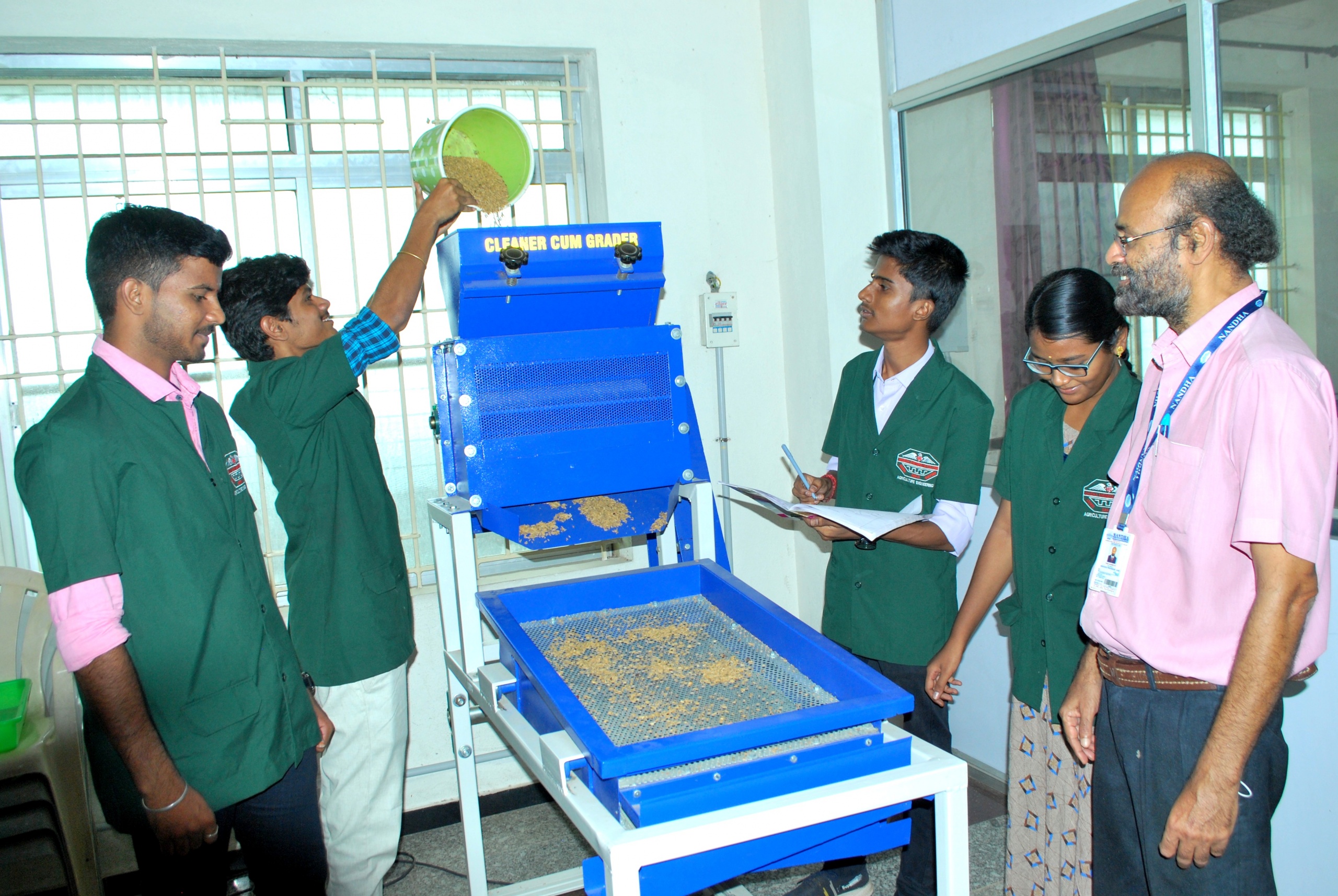 |
List of Equipments
- Paddy Parboiling Unit
- Inclined Belt Separator
- Tray Dryer
- Spiral Separator
- Porosity Apparatus
- Coefficient of Friction Apparatus
- Angle of Repose-Round type
- Angle of Repose-L type
- Dhal mill
- Screw conveyor
- Rubber Roll Sheller
- Bucket Elevator
- Cleaner cum Grader
- Thin Layer Dryer
UNIT OPERATIONS LABORATORY
The laboratory is well equipped with the various types of mills and seperators. Guidance is provided to the students by a team of expert faculty and lab technicians. Students are supported to create innovative ideas to develop modern mills.
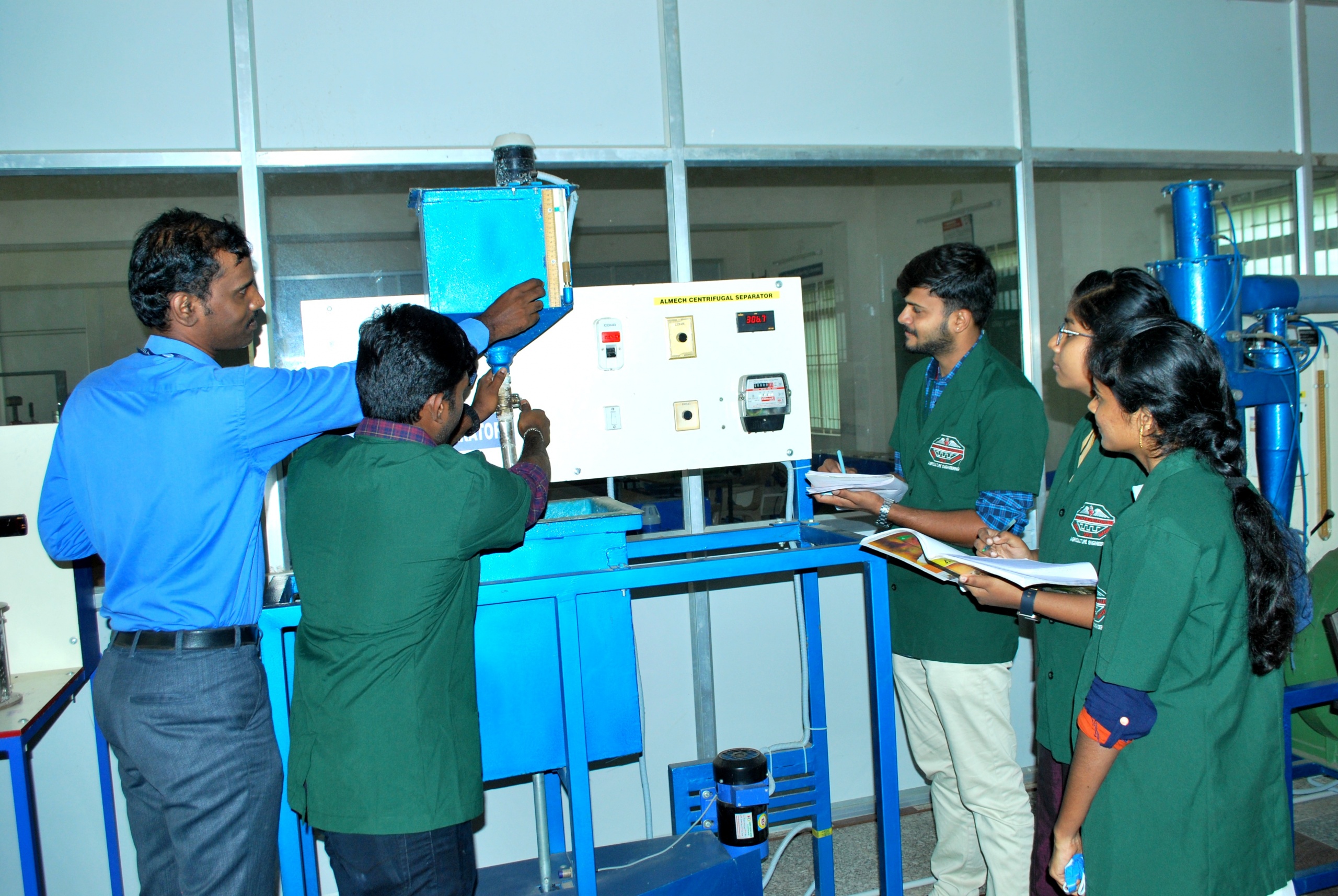 |
List of Equipments
- Centrifugal separator
- Hot air oven
- Cyclone separator
- Shieve shaker
- Ball mill
- Pin mill
- Burr mill
- Hammer mill
- Grain moisture meter – probe and digital
FOOD AND DAIRY ENGINEERING LABORATORY
Food and dairy laboratory support regulatory analysis of food and agro products. The laboratory equipped to analyze the physico-chemical characteristics of food materials including raw materials and finished products which helps the agricultural engineers to gain a broad-spectrum knowledge on processing of food materials and testing of samples.
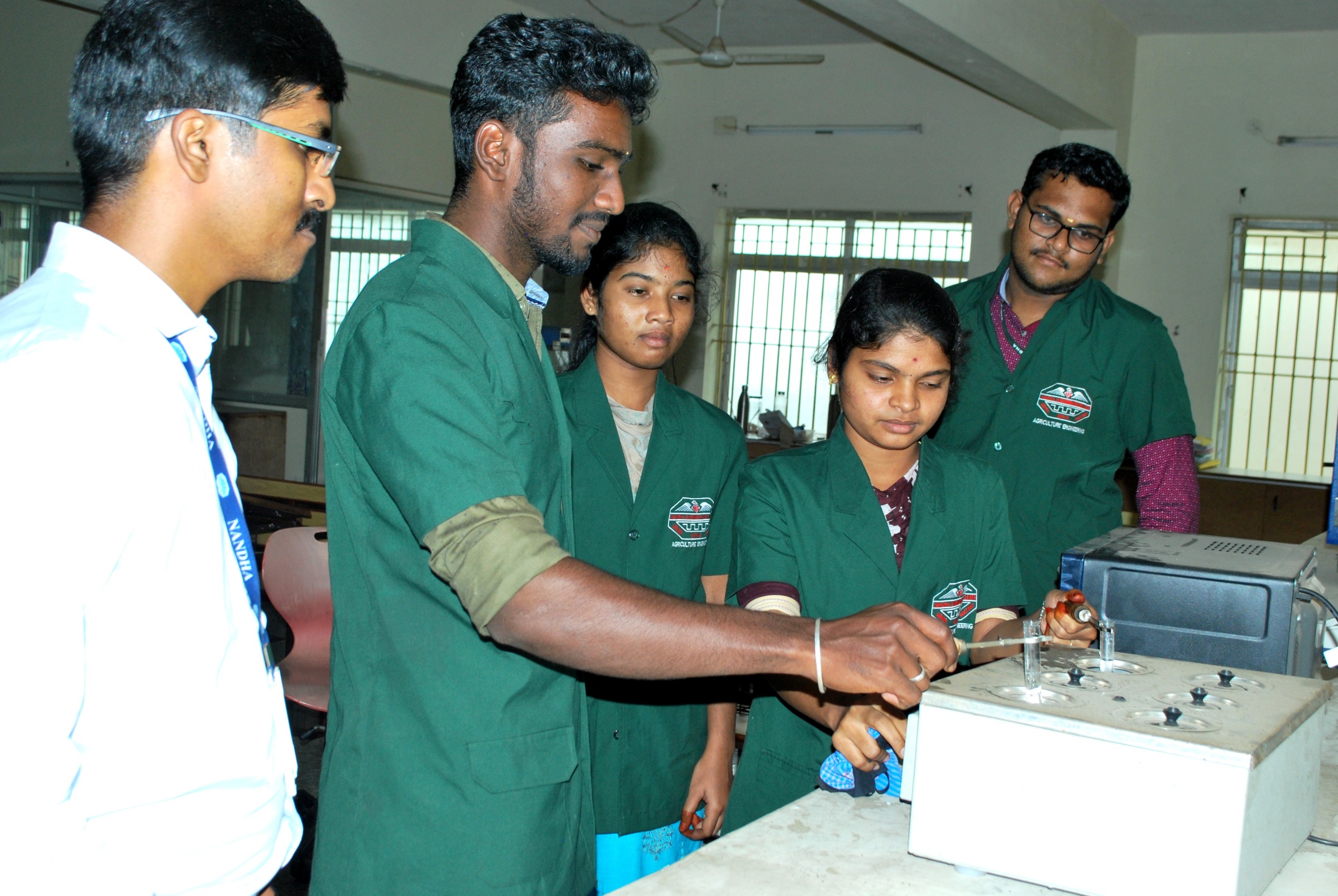 |
List of equipment
- Laminar air flow chamber
- Gerber centrifuge
- Hot air oven
- Microwave oven
- Incubator
- Tray dryer
- Water bath
- Digital ph meter
- Cream separator
- Refrigerator
- Digital thermometer
- Lactometer
- Gun thermometer
News Letter
Continuous Improvement
PROFESSIONAL BODIES
Faculty Members of the Agricultural Engineering are the members of:
- Indian Society for Technical Education (ISTE).
Students of the Agricultural Engineering are the members of


